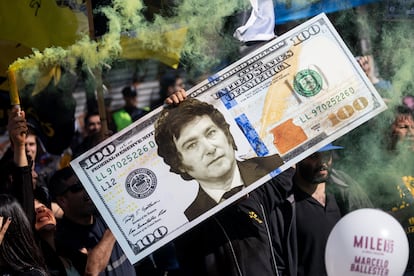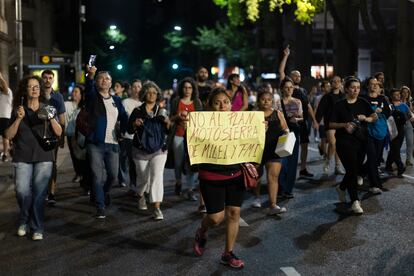Argentina to receive IMF delegation under pressure from dollar shortage and plans that clash with Congress
The new far-right president Javier Milei is confident that the International Monetary Fund will accept his program after the meeting this Friday in Buenos Aires. But the government has ruled out the option of new financing

With the arrival of the far-right Javier Milei to the presidency, Argentina is inaugurating a new phase in relations with the International Monetary Fund (IMF). Representatives of the organization are due to meet on Friday with the government in Buenos Aires to renegotiate the agreement that Argentina has had with the IMF since 2018, when the conservative Mauricio Macri got into $44 billion worth of debt, and the payment plan signed in 2020 with the left-wing Alberto Fernández. Milei is confident that the negotiation will be successful because the spending cuts that he has already begun to apply are “harsher,” according to his own assessment, than what he is being asked for by the IMF. The international organization is wondering whether the new president will be able to implement his orthodox and pro-market plan, which has already met with resistance on the streets, in Congress, and in the courts.
Argentina must now pay off the $44 billion debt assumed by Macri. The Fernández administration that succeeded Macri agreed to a new payment plan in exchange for a series of fiscal and monetary goals. The current program had its last revision approved in August. The Fund then considered that Argentina had not met the goals, but still authorized a new disbursement because it assessed that the non-compliance was due to an “unprecedented drought and policy deviations.” Now a new review is pending that was meant to be conducted in December, and was postponed following Milei’s victory at the polls.
The current administration feels that, since the country “did not meet” the objectives, the 2020 agreement has been “virtually dropped.” But formally it is not so, and the IMF representatives will meet on Friday with Chief of Staff Nicolás Posse, Economy Minister Luis Caputo, and authorities of the Central Bank to “redirect” the negotiations, according to the presidential spokesperson, Manuel Adorni.
This will be the first meeting in Buenos Aires after Argentine officials and representatives of the organization met in Washington in December. Kristalina Georgieva, head of the IMF, said then that the organization is “very interested” in supporting Argentina. Georgieva had held a videoconference conversation with Milei days before. “The Fund was collaborative,” said the president in a message on the X social platform, where he described the talk as “excellent.” Because of this and the depth of the adjustment that Milei has already begun to implement — he devalued the currency by 50% and announced the end of subsidies for transportation and energy, among other measures — the government is confident that it will have the support of the IMF.
A successful agreement would allow the government to strengthen the balance of payments, which is currently compromised, and send a message to international investors. Some analysts, however, point out that the very orthodoxy of Milei’s economic program, which is partly based on measures imposed by decree or not yet approved in Congress, may cause differences with the IMF.
“The government is demonstrating commitment to implement the reforms it is proposing,” says Pablo Nemiña, a researcher in political economy at the National Council of Scientific and Technical Research (Conicet), the University of San Martín and the Latin American School of Social Sciences (Flacso). But that is not enough, he adds: “It must also demonstrate that the policies are sustainable, that is, that they can be implemented because they have a certain degree of support.” In economics, he explains, experts talk about ownership, which would be the “property or control” that a country has over the agreement.
That’s where Milei has a problem. Although the ultranationalist leader won the presidential runoff with 56% of the vote and popular support is still broad, his party, La Libertad Avanza, is in a minority in Congress. The bill that he presented with more than 600 measures to reform the political, economic, and social system must still overcome legislative hurdles. And so must the mega-decree that he imposed with more than 300 reforms and which is already being questioned in court as “unconstitutional” — a court already suspended part of that decree on Wednesday. The streets pose another challenge: citizens from different parts of the country have come out to reject the measures almost daily, and the country’s main union, the General Confederation of Workers, has already called for a general strike on January 24.

Nemiña believes that obtaining support for the measures will be key to framing the link between both sides. “Reforms can always be made. But society must be involved and the government must be willing to see its ideas adapted. If you think society is wrong, you have to convince it of that fact. For that purpose, there is an extraordinary instrument called politics,” he points out.
“The IMF is more political and it knows that there needs to be some type of negotiation that will allow these reforms to advance, containing in some way the affected sectors,” says Francisco Cantamutto, a doctor in social sciences specialized in economics and a researcher at Conicet. Cantamutto explains: “If the IMF accepts an ideological position like that of the Milei government, it runs the risk of the program collapsing very quickly if society cannot tolerate it. On the other hand, if it seeks a smaller, but more socially viable program, it would be below the demands of the government itself. We are facing a relatively new situation, which the IMF has to study carefully.”
The Friday meeting will be followed by more stages. While the parties negotiate, Argentina’s payment schedule with the Fund follows its pre-established path. After the IMF interrupted disbursements following the defeat of the ruling party in the November elections, the Milei government negotiated a new $960 million loan with the Development Bank of Latin America and the Caribbean-CAF to meet December maturities. The country will have to pay almost $7.3 billion this year. The first maturity is on Monday, January 9 and the second one a week later, on January 16, for a total of $1.9 billion.
Harmony with the Fund
The IMF has intervened in Argentina’s economy during periods of democratic governments and during dictatorships, with liberal and protectionist administrations. Former president Juan Domingo Perón refused to join the list of associates of the organization when it was created in 1944 because he considered it “a putative new spawn of imperialism.” But 10 years later, General Pedro Aramburu took out the first loan after assuming power with a coup in 1955. There began the country’s history of encounters and disagreements with the IMF, an acronym that Argentines associate with unpopular and deep adjustments, with economic and social crises, such as the corralito crisis of 2001 and the default on a foreign debt of $144 billion.
In 2006, the Peronist president Néstor Kirchner settled Argentina’s debt with the Fund and inaugurated an era of more distant relations. The organization closed its office in Buenos Aires and Argentina was exempt from the periodic reviews of its technicians. For 15 years, the country did not ask for assistance. Then in 2018, shortly before the end of his term, Macri asked for a new bailout.
The stage that Milei now opens is more orthodox and pro-market, “aligned with the strategy of neoliberal governments that have passed through Argentina before, but from a more extreme ideological position and more skewed to the right,” says Cantamutto. The economist points out two particularities. One is the “position of severe political weakness” that Milei has in parliament, and another is “a different international scenario.” “Today we are not facing the unipolar world of the 1990s. The global hegemony of the United States is being threatened by the rise of the BRICS headed by China,” he says.
New geoeconomic strategy
Argentina has just formally announced that it will not participate in the BRICS group, the economic alliance made up of Brazil, Russia, India, China, and South Africa to which Argentina acceded in August. The decision is in line with Milei’s vision of getting close to the United States, Israel, and “the free world” in general, far from the countries he considers to be “communist.” China is on that prohibited list, but also Brazil. “This influences the relationship with the IMF, which is so influenced by the United States,” says Noemí Brenta, a doctor in economics from the University of Buenos Aires. “I suppose the government is playing this external repositioning as a means of pressure to receive more favorable treatment from the Fund,” she adds.
Brenta, however, thinks it will be “difficult” for the Fund to grant Argentina additional financing on top of the agreement that expires in September 2024. “The agreement with the Fund is already 84% disbursed. We can’t expect much more than those $7 billion [that remain]. And that will be used to pay the Fund itself,” she says. “What other financing options does the government have? None of significant importance. It has already cooled relations with China and China has refused to activate the new section of the currency exchange swap, so we cannot count on that. The amounts that other organizations — CAF, World Bank, Inter-American Development Bank — can lend us are minimal for Argentina’s need for external financing.” Argentina’s external debt amounts to almost $300 billion.
Sign up for our weekly newsletter to get more English-language news coverage from EL PAÍS USA Edition
Tu suscripción se está usando en otro dispositivo
¿Quieres añadir otro usuario a tu suscripción?
Si continúas leyendo en este dispositivo, no se podrá leer en el otro.
FlechaTu suscripción se está usando en otro dispositivo y solo puedes acceder a EL PAÍS desde un dispositivo a la vez.
Si quieres compartir tu cuenta, cambia tu suscripción a la modalidad Premium, así podrás añadir otro usuario. Cada uno accederá con su propia cuenta de email, lo que os permitirá personalizar vuestra experiencia en EL PAÍS.
¿Tienes una suscripción de empresa? Accede aquí para contratar más cuentas.
En el caso de no saber quién está usando tu cuenta, te recomendamos cambiar tu contraseña aquí.
Si decides continuar compartiendo tu cuenta, este mensaje se mostrará en tu dispositivo y en el de la otra persona que está usando tu cuenta de forma indefinida, afectando a tu experiencia de lectura. Puedes consultar aquí los términos y condiciones de la suscripción digital.








































